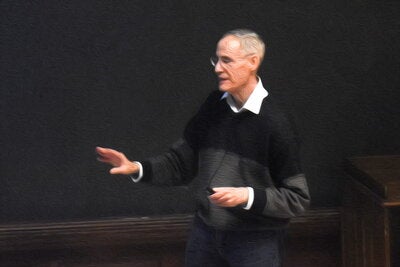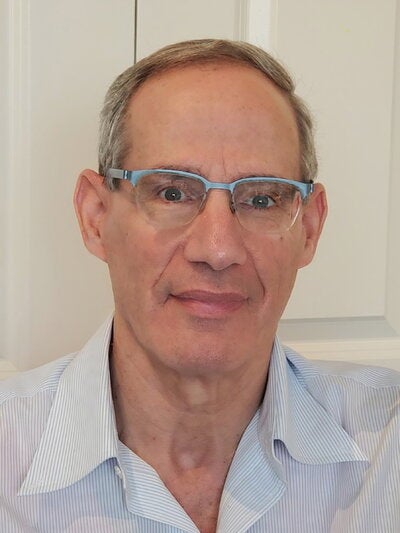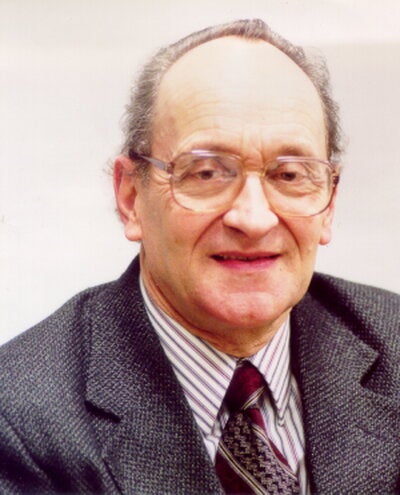
The Tondeur Lectures in Mathematics was created by the Department of Mathematics in 2012, named in honor of Professor Emeritus Philippe Tondeur to recognize his contributions to the mathematics community. This biannual series is offered in alternate years with the Coble Lectures. The lecture series is supported by an endowment funded by Philippe and Claire-Lise Tondeur.
Recent Lectures in This Series

In a series of three lectures, we revisited three well-known examples of distance problems in discrete geometry: the Erdős Unit Distance Problem, the Erdős Distinct Distances Problem, and the Hadwiger-Nelson Problem.
Alon discussed recent solutions of the analogs of all three problems, and how combinatorial, geometric, and probabilistic methods can be combined with tools from linear algebra, topology, and algebraic geometry to answer related questions. These talks were based on joint works with Matija Bucić, Lisa Sauermann, Colin Defant, Noah Kravitz, and Daniel Zhu.
Schedule
| Title | Date/Time | Location |
|---|---|---|
| "Unit distances" | Dec. 5 4:00 p.m. |
180 Bevier Hall Reception in Bevier Hall Commons to follow |
| "Distinct distances and equilateral numbers" | Dec. 6 4:00 p.m. |
4025 Campus Instructional Facility Refreshments available beginning at 3:30 p.m. |
| "Coloring and ordering" | Dec. 7 4:00 p.m. |
4025 Campus Instructional Facility Refreshments available beginning at 3:30 p.m. |

Noga Alon is a professor of mathematics at Princeton University and a Baumritter professor emeritus of mathematics and computer science at Tel Aviv University, Israel. He studies combinatorics and graph theory and their applications in theoretical computer science. Among his contributions are the study of expander graphs, the investigation of de-randomization techniques, and the foundation of streaming algorithms.
Alon is a member of the Israel Academy of Sciences and Humanities and the Academia Europaea; he is an honorary member of the Hungarian Academy of Sciences. He recently received the Shaw Prize in Mathematical Sciences and the Knuth Prize for outstanding contributions to the foundations of computer science.
| Year | Lecturer | Lecture Title |
|---|---|---|
| 2013 | Jeff Cheeger, Courant Institute of Mathematical Sciences, New York University | Quantitative Behavior of Singular Sets for Certain Geometric PDE's |
| 2015 | Gregory Margulis, Yale |
Dynamics, Geometry, and Number Theory |
| 2017 | Ulrike Tillmann, Oxford University April 25-27, 2017 |
Topological Quantum Field Theories in Homotopy Theory |
| 2019 | Andre Neves, University of Chicago April 9-11, 2019 |
Recent progress on existence of minimal surfaces |
About Philippe Tondeur

Tondeur’s research is in differential geometry, topology, and partial differential equations. He is an influential advocate for mathematics and science policy at the national and international levels. He earned an engineering degree in Zurich, and a Ph.D. in mathematics from the University of Zurich. He subsequently was a Research Fellow and Lecturer at the University of Paris, Harvard University, the University of California at Berkeley, and an Associate Professor at Wesleyan University, before joining the Department of Mathematics at Illinois in 1968.
He served as Chair of the department from 1996–1999, and then as Director of the Division of Mathematical Sciences at the National Science Foundation (NSF) from 1999–2002. Tondeur was an Invited Hour Speaker of the AMS in 1976. He has received a 1985 Award for Study in a Second Discipline (Physics) at Illinois, the 1994 William F. Prokasy Award for Excellence in Undergraduate Teaching at Illinois, a 2002 Frederick A. Howes Commendation for Public Service from SIAM, and the 2008 SIAM Prize for Distinguished Service to the Profession. In 2009 he was selected in the inaugural class of Fellows of SIAM. In 2010 he was selected a Fellow for the American Association for the Advancement of Science (AAAS). In 2012 he was elected in the first class of Fellows of the AMS.